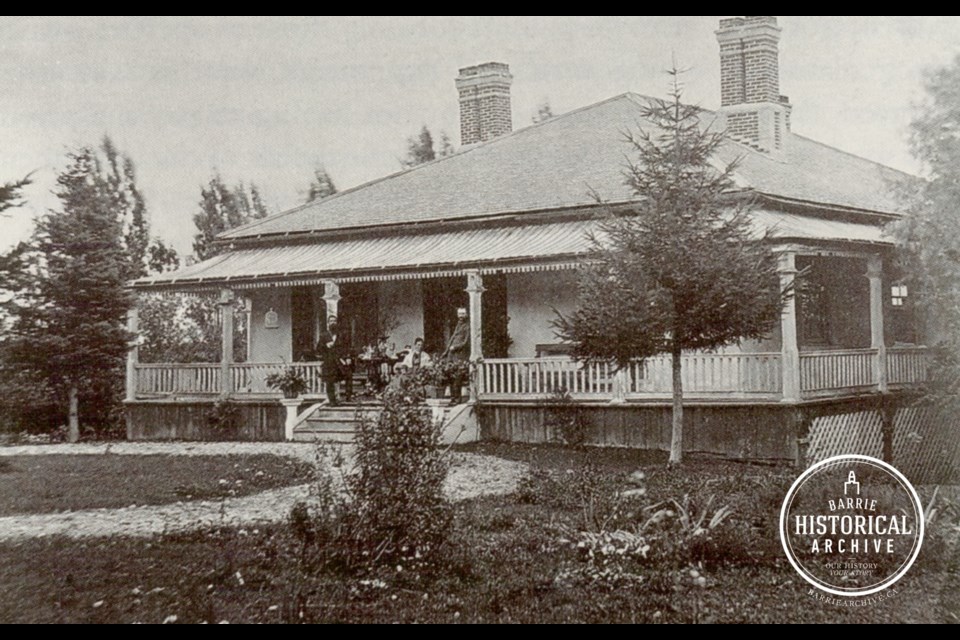This ongoing series from Barrie Historical Archive curator Deb Exel shows old photos from the collection and one from the present day, as well as the story behind them.
Rose Cottage
Located at 31 Davidson St., along the farthest boundary of my favourite historic neighbourhood, the Grove, is Rose Cottage. You might not recognize the name, but if I called it the Dyment or Newton’s farm, you may immediately know the place.
Rose Cottage was built in the mid-1840s for John and Elizabeth Bingham, who arrived in Canada from England, along with many brothers, sisters and other assorted relatives, in the early 1830s.
Bingham had operated a hotel in York before coming to Barrie. He built a log hotel, the King’s Arms, on the north side of Dunlop Street, east of Mulcaster, in 1832. It was later known as the Queen’s Arms in 1846.
Bingham had subdivided the Rose Cottage property into park lots before he died in 1855.
The humble mud or burnt brick constructed farmhouse had a number of prominent owners over the years. In 1862, Allan Gunn, one of Canada’s wealthiest lumbermen, bought Rose Cottage.
Just a few years later, in 1867, Gunn would start construction of a grist mill on John Street (now Maple Avenue), but went bankrupt soon after due to a slump in the lumber market. James Wilkinson bought the steam grist mill at auction the following year.
In 1878, local politician D’Alton McCarthy won the North Simcoe riding and moved his family to Toronto. However, he kept their impressive Wellington Street mansion, Carnoevar, as a summer residence and they bought Rose Cottage as their cattle farm.
Later, a source notes that Nathaniel Dyment owned the farm. Records also show that Nathaniel’s son, Simon, who owned the magnificent Maplehurst at 72 High St., held title of the old Bingham property as well until the late 1930s.
But many people will remember this area, and Rose Cottage, as Newton’s farm. After graduating with a bachelor of science in agriculture (BSA) degree from the Ontario Agricultural College in Guelph in 1938, Charlie Newton returned to Barrie to work the family farm — Oakley Park.
The Newton farm was known for its outstanding hogs. In 1945, the annual Simcoe County Yorkshire Breeders Sale was held at Oakley Park instead of the barns of the Barrie Agricultural Society, with more than 200 hog producers attending. Breeders were invited to meet Mr. Newton’s prize boar – the grand champion of the Collingwood Fair the previous year.
Also in 1945, the federal government bought up 35 acres of the Newton farm on Peel Street to build new homes for the exploding population in Barrie following the end of the Second World War. In spite of all the building that occurred in 1947 and 1948, by early 1949, Barrie needed at least 450 more homes for veterans, resulting in many of the rental houses built on Gunn Street.
Newton, besides farming, served on the public school board for eight years starting in 1949. It was during that time that Codrington Street, Hillcrest and Oakley Park schools were built and construction on Johnson Street school was underway.
In 1951, Newton ran as a Liberal candidate, and sat on the board of directors of the Ontario Hog Producers within the Department of Agriculture. He was a candidate for mayor of Barrie in 1959, along with Willard Kinzie and Jim Hart.
Newton continued farming until 1952 – by then, it was just not economical to operate anymore. But as manager of the Barrie Marketing Yards, Newton continued to have involvement with livestock and agriculture.
By 1961, when Charlie was running for alderman, there were now 300 homes and two schools on the land that was once Newton’s farm. The photo from 1951, taken from the backyard of the Dyment home at 135 Peel St., provides a rare and remarkable view of the old farm land before subdivision development started.
Sadly, Charlie Newton’s political career and community service, which began as a boy who lived at 60 Mulcaster St., close to city hall, and who listened to E.C. Drury (later premier of Ontario) and Mayor Craig while chasing pigeons in the loft, ended far too early, in 1965 at the age of 51.
But a little bit of Newton’s farm remains. Tucked back from the street, the same creek behind it, sitting on a little ridge that many children have sledded on, Rose Cottage endures.



